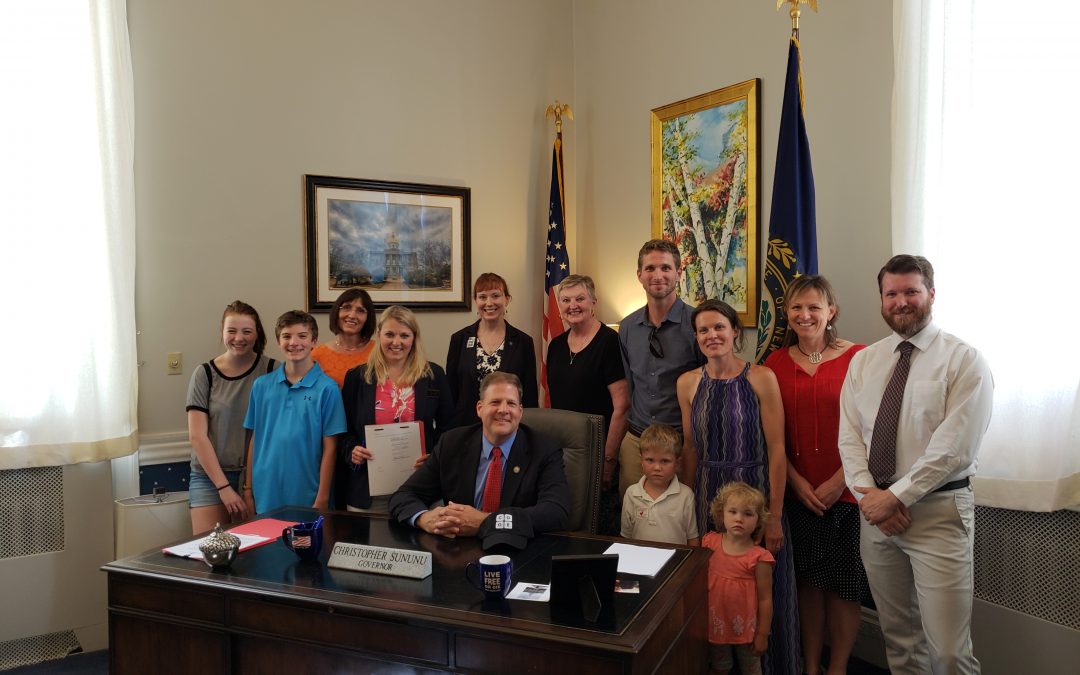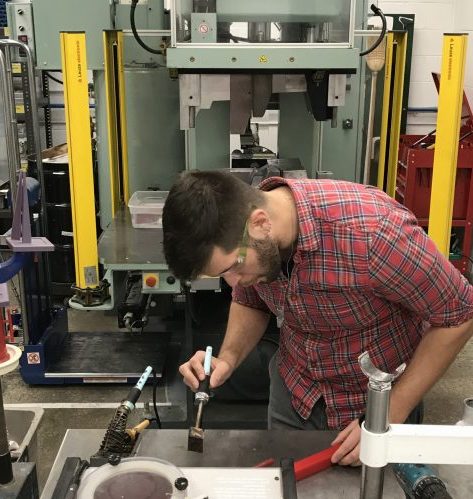
Nov 19, 2018 | Impact, Leadership
Recently, Steve Rothenberg, NHCTA/NH-CTE President, joined a diverse group of leaders from across the nation in California to discuss ways to better advance the skilled trades in the automotive, construction, manufacturing, welding and HVAC sectors.
The trip was sponsored by Harbor Freight Tools for Schools, whose guiding principle is grounded in a deep respect for the skilled trades and desire to create real opportunity for kids who love to build, fix and create. Harbor Freight Tools for Schools is a philanthropic programs of The Smidt Foundation, founded by Eric Smidt, owner of Harbor Freight Tools.
“Harbor Freight Tools for Schools brought us in to advise them on their funding priorities,” said Rothenberg.
Noting there were some “highlight influential people” in attendance, including several state commissioners of education, United Way worldwide executives, LA public transportation system architects, CTE professionals and others, Rothenberg expressed enthusiasm for their collective recommendations.
“The group felt that a pipeline for skilled trade teachers and overcoming the ‘stigma’ of the trades are the two top issues for the foundation to address moving forward,” he said. “It was a very well organized event, and I was pleased to be able to represent the interests of NH and CTE.”
In addition to receiving recommendations from the group regarding funding priorities, Harbor Freight Tools for Schools sought advice on the merits behind getting involved in policy work at the federal, state, local and/or grassroots levels.
According to Rothenberg, Harbor Freight Tools for Schools has already become deeply involved in CTE, as he noted their first foray in this arena was last year.
“They awarded $500,000 worth of prize money to ten top CTE trade teachers in 2017,” he said. “Teachers actually received $10 to $30K directly, while their programs got the rest. This year, the total was raised to $1 million…The application process has some interesting reflective elements that I think could be used for professional development.”
In reflecting on his experience at the national conference, Rothenberg said he cannot help but look ahead at other issues that could be pursued by NH-CTE. These issues, he said, cover broad areas, some of which include:
How to
- Overcome some age limits for trade-based pre-apprenticeships.
- Connect employment security, postsecondary and secondary databases to test the impact of interventions/learning, such as CTE completion.
- Establish career-related competencies for school counselors.
- Establish career credential recognition model for high school graduates.
- Create CTE teacher-leader pipelines to enhance succession planning.
- Refine and further establish ESSA career-related metrics.
- Establish statewide WBL models.
- Advocate for years of service credit for industry experience on the teacher scale for new CTE teachers.
“There is a lot for us to think about in NH and nationwide when it comes to CTE,” he added. “The conference got me thinking about an even bigger picture and the possibilities that could exist through Harbor Freight Tools for Schools.”
To learn more about Harbor Freight Tools for Schools, visit https://harborfreighttoolsforschools.org.

Nov 8, 2018 | College, Impact, Industry, Programs
With the majority of STEM jobs in computing and a projected job growth of 13% compared with 6.5% growth across all occupations, the need for computer science education has never been greater.
It is this need that in part led Creative Computing Challenge (CCC), a five-year program funded by the National Science Foundation, to establish CS4NH. A working group of business/industry, non-profits, and K-12/higher education members collaborating to bring computer science to all New Hampshire K-12 students, CS4NH is working to increase access to and participation in Computer Science educational opportunities.
CS4NH’s Terry Wolf, a NH state legislative representative and vice chair of the House Education Committee, cited “a huge shift” in the public’s understanding of the need for computer science education.
“Not too long ago, people thought Computer Science only needed to be offered at the high school level as an elective,” she explained. “Today, people want kids to be more than consumers of technology. They want them to be the creators, innovators and problem solvers.”
She said this shift in understanding, furthered by advocacy efforts by CS4NH, led to the passage of NH House Bill 1674 earlier this year, which made Computer Science as a core K-12 subject area.
“After listening to a wide variety of stakeholders, adding Computer Science to the definition of an adequate education matched what people are looking for,” she said. “The bill passed with wide bipartisan support in the legislature.”
CS4NH’s Beth Doiron, Director of College Access and DOE programs and initiatives at the community college system of NH, said skills learned in computer science courses help students build basic problem-solving skills.
“Computer science instruction helps students understand how to accomplish tasks more efficiently and help them be better prepared for college in general, regardless of their career or program major choice,” she said.
CS4NH has forged several strategic partnerships, including one with the New Hampshire Tech Alliance, which Executive Director Matt Cookson said makes sense for them in several ways.
“CS4NH goals align perfectly with the goals of our Workforce Development committee and mission of the organization,” he said. “Being able to house the efforts of CS4NH and support its growth and implementation was a logical step as we look to encourage more young people to learn about Computer Science in New Hampshire.”
Judith Burrows, Director of Student Aid at the New Hampshire Charitable Foundation, another CS4NH collaborator, said her biggest takeaway from computer science is the thought processes such a curriculum seeks to encourage.
“Computational thinking is much more than just programming or IT,” she said. “It is foundational for all businesses. It really is the currency that businesses are looking for regardless of the field.”
Citing computational thinking as “the backbone” of various forms of technology, Lori Langlois, Director, North Country Education Services, said Computer Science addresses current and future needs.
“Given the known workforce shortages in NH in computer programming, web development, and other skilled computing fields, CS4NH has an important role in advocating to increase access and participation in CS to foster these career paths for students,” she said.
Langlois said CS4NH is particularly important in her region.
“For the North Country, computer science holds the potential for developing an
innovation economy,” she said. “In order to attract new or expanding businesses, northern NH schools are focusing on computer science with the intention of making visible, the young, energetic, and talented individuals we are developing for a STEM-skilled employee pipeline.”
To learn more about CS4NH, or any related initiative, visit cs4nh.org.
This is the final story of a multi-part series on CCC and the relevance of computational thinking in the classroom and industry in NH.

Oct 24, 2018 | Industry
Non-profit New Hampshire Lodging & Restaurant Association (NHLRA) is often involved in CTE events and initiatives, which reflects its mission “to promote, advocate, educate, and inform the hospitality and tourism industry in New Hampshire.”
One way NHLRA achieves its mission is through the Sector Partnership Initiative (SPI), a grant funded, industry led collaboration that addresses current workforce needs in five key sectors across New Hampshire.
The hospitality industry is one of these sectors.
“My role is to look to make connections between industry, funding resources, and education,” said NHLRA’s Amie Pariseau, who serves as Sector Partnership Advisor. “With workforce shortage a challenge, employers need someone to break down barriers, find solutions, and create a network to assist in those challenges.”
Building off this initiative, Pariseau said she is also involved in Girl Incorporated and Girl Scouts, which she said educates younger students on the nature of hospitality and available employment opportunities.
“We want to boost their interest in the industry and have them think outside the box,” she said. “For example, students think of a chef when it comes to a restaurant, but what other skills and jobs might be available there?
Held on October 15, ProStart Boot Camp is another hospitality initiative in which NHLRA is involved. It was the first of its kind in New Hampshire. ProStart is a nationwide, two year program for high school students developed by the National Restaurant Association. Eleven Career and Technical Education (CTE) centers actively teach the industry-driven curriculum, which “provides real-world educational opportunities and builds culinary techniques, practical management skills and a foundation that will last a lifetime.”
“With thirteen industry members ranging from ACF certified chefs to a director of lodging operations, seven schools, ten teachers, and forty students in attendance, it was a great day for collaboration between education and industry,” she said.
NHLRA also works with The Extended Learning Opportunities Network, which Pariseau describes as “a great group of educators dedicated to providing their students opportunities to demonstrate competencies outside the traditional classroom setting such as project based learning with a mentor, job shadowing, or internships.”
“In conjunction with two properties, I’ll be hosting the ELO Coordinators to give them behind the scenes look at the hospitality industry, talk about career pathways, and hopefully have a student story,” she added.
In April, the NHLRA will spearhead the second New Hampshire Hospitality Month. In addition to organizing tours throughout the hospitality industry for schools and community groups, Pariseau said they hope to ramp up with community college involvement, Chef to School nights, and more for 2019.
According to her, constant involvement in CTE related events and initiatives is critical to NHLRA’s mission, which also includes strengthening relationships with NH’s education system at the secondary and post-secondary level.
“CTE offers students practical classroom learning as well as hands-on experience preferably in an industry setting,” she said. “They’re able to try out a career in high school. “The opportunity to have a look into the ‘real world’ is so beneficial to them as they begin to formulate their future goals.”
In building relationships with schools and industry, Pariseau said NHLRA helps augment existing career pathways and build new ones.
“We want to connect student to our industry members and provide them with mentors, too,” she said. “We strive to get students out of the classroom and industry into the classroom.”
To learn more about NHLRA, visit https://www.nhlra.com.

Oct 22, 2018 | Article
On October 9, the New Hampshire Joint Engineering Societies (NHJES) held its 12th Annual Conference, which featured subject matter experts on topics like Artificial Intelligence, ReVision Energy, Climate Adaptation in Dover Master Plan and more.
For the second year in a row, the conference also included secondary teachers and students, the latter of whom displayed their own projects and presentations.
“This platform has became an outlet for students to experience learning outside of the classroom,” said NHEJS Board Member Frank Xydias of the Milford High School & Applied Technology Center. “It also gives students the chance to work alongside of engineers and meet engineers that can become a positive influence in their career development.”
Members in NHEJS include the New Hampshire Society of Professional Engineers, American Council of Engineering Companies, American Society of Civil Engineers – NH Section, IEEE – New Hampshire Section, Society of Women Engineers, Southern New Hampshire, Structural Engineers of New Hampshire.
In hosting the conference and inviting students and teachers, Xydias said they take a meaningful step toward achieving their mission “to provide education, leadership, and support for the profession of engineering across all disciplines of practice.”
As far what he hopes the public can better understand about engineering, Xydias cited its ubiquitous nature.
“There are over 40 type of engineering degrees and a multitude of subcategory professions,” he said. “An engineering career can lead to many other professions.”
He also noted that engineering need not be viewed as an onerous subject, either. At its core, he said, engineering is about people who like to problem solve.
“As young children, we are trained to become engineers,” he said.
He cited various toys as examples in which children learn to become engineers. These examples included Play-Doh, toy models, LEGOs, checkers, chess, and other games.
Play-Doh, for example, uses manufacturing engineering.
“It uses vocabulary and actions of injection molding like ‘extrude, form, press, fit, mold, gate, sprue’ and similar terms,” he said. “As an educator of engineering, I bring back wonderful childhood memories of building LEGOs, using play-doh, or playing checkers back into the classroom. These recollections can be a powerful way to make connections for students that keep them engaged and learning.”
As for the subjects discussed at this year’s conference, Xydias said the experts provided deeper insight into each one. Jim Issaak of IEEE, for instance, talked about recent developments in Artificial Intelligence and its emerging role in our professional and personal lives.
Frank Edelblut, commissioner of the NH Department of Education, presented “The Role of Education in the Tech Era.”
“It was a great conference that helps set the stage for what’s next in engineering,” said Xydias.
As for what is next, Xydias acknowledged he is not sure, which he said makes the engineering field so interesting.
“Kids in kindergarten this year graduate in 2031,” he said. “The careers that students will be going into have not yet been developed, and STEAM and engineering careers are the foundation of these changing careers…We might find ourselves in scenes from Star Trek, 3d printing our food, flying to the store, or working with some other futuristic AI.”

Oct 8, 2018 | Article
An entire month of celebrating manufacturing in New Hampshire!
For the last 5 years, New Hampshire Manufacturing Extension Partnership with help from the New Hampshire Department of Business and Economic Affairs, the Business and Industry Association, the New Hampshire High Tech Council, the Community College System of New Hampshire, the New Hampshire Department of Education and many other partners have organized Manufacturing Month.
What is it all about?
Throughout the month of October, high school and middle school students will be going on field trips to visit local manufacturers. During those trips, manufacturers will have the opportunity to show students how cool manufacturing is and inform them of all the in-demand careers their field has to offer. Students will have the chance to interact with employees and get an up-close look at the ins and outs of manufacturing in New Hampshire. For manufacturers, it opens up a new supply of talent to help them build the future skilled manufacturing workforce.
NH CTE’s and community colleges will also schedule open houses in the month of October for students and members of the community. The schools will have the opportunity to show off their advanced manufacturing programs, facilities, and machines. Potential students will learn about all of the educational options in advanced manufacturing and will leave convinced that staying local and building a future here in New Hampshire is the best career move for them.
What did the students say?
Students had this to say about their visits to manufacturers:
- Very interesting to see how the facilities worked and how the machines all worked together to make the product.
- The field trip was highly informative and interesting. It gave me a broad variety of different things
manufactured right in our local area.
- The field trip was really great! I learned a lot and can honestly say it’s one of the best field trips that I’ve been on with the school.
- It was eye-opening in the sense that I could be doing something like this in the future.
To participate: Contact, Jill Duddy at (603) 226-3200 or jilliand@nhmep.org
Schools – Click Here Manufacturers – Click Here





